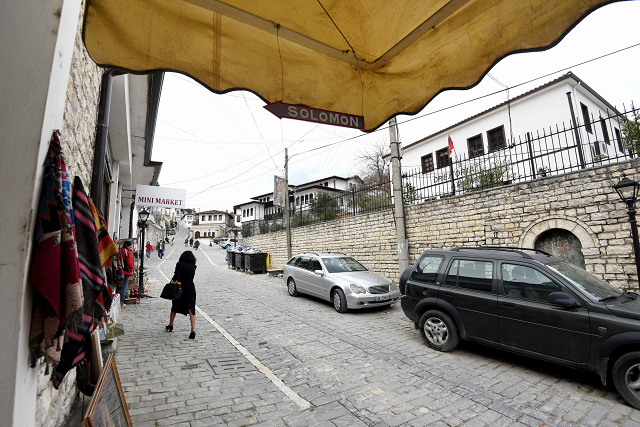Six key periods in Jewish history
From exile to the creation of the state of Israel

A picture taken on February 6, 2019 shows the entrance of the Solomon Jewish history museum in the Albanian city of Berat. - The Balkan state is the only Nazi-occupied territory whose Jewish population increased during World War II, thanks to the bravery of ordinary families who harboured thousands of refugees fleeing persecution during the Holocaust. The tiny Solomon Museum, which opened in the city of Berat last year, was a labour of love for local historian Simon Vrusho. But his death last month at age 75 has put its future at risk, with rent only paid through to April. PHOTO: AFP
Conquered by Rome in 63 BCE, the Judaeans of the ancient kingdom centred in Jerusalem attempted two uprisings that were violently repressed.
The first, in 66 CE, led to the siege of Jerusalem and the destruction of its Temple; and the second in 132 CE when the city was razed and much of its population massacred.
The Jews were banned from entering Judea and many emigrated.
The Arab conquests began in the 7th century with the birth of Islam. In some cases, the Jews supported the conquests and in turn, were tolerated by the Arabs.
During this period, Jerusalem became a sacred place for Judaism, Christianity and Islam.
The Arabs reached the Iberian peninsula in 711. Five percent of the population were Jews and the period marked the start of a golden age for Jewish culture, with Jews generally tolerated in Europe.
What is a Jew, a Semite, a Zionist?
In 1095, European Christians organised Crusades to free sacred land from Muslim expansion. In the course of these "holy wars", Jewish communities were also massacred.
In the 12th century, while the papacy defended the Jews, they became an issue for monarchs. In 1182, Philippe II was the first French king to expel Jews.
Jews were accused of a range of ills, including the Black Plague in the 14th century, and sometimes they were subjected to Inquisition tribunals that hunted down heretics and witches.
Charles VI forced all Jews out of France in November 1394, ending 10 centuries of Jewish history in the country.
In Spain, a series of campaigns by Christian states to recapture territory from the Muslims ended in 1492. Catholic kings demanded Jews either convert or leave. A large section settled in the Ottoman Empire.
After the French Revolution, France in 1791 became the first European country to pass a law granting Jews equal rights.
But the 19th century saw a resurgence of anti-Semitism, notably in Eastern Europe where the world's biggest Jewish community lived.
In the Russian Empire, in particular between 1881 and 1884, Jews were targeted by violent attacks known as pogroms.
Many Jews emigrated to North America and some went to central and western Europe. In 1882 tsarist Russia adopted what would be the most systematically anti-Jewish legislation until Nazi Germany.
In France, Alfred Dreyfus, a Jewish officer, was unjustly convicted in 1894 of treason in a case that split the country. He was deported to French Guiana before being pardoned and returning in 1906.
Zionism emerged in the 19th century with the aim of bringing together Jews in Palestine. The 1896 publication of "The State of the Jews" by Austro-Hungarian journalist Theodor Herzl gave Zionism a political character.
Anti-Semitism and the pogroms precipitated the arrival of Jews in Palestine when it was a province of the Ottoman Empire. Some 50,000 Jews were there in 1900, double the number in 1880.
With the Balfour Declaration in 1917, Britain backed the establishment of a national home for the Jewish people in Palestine.
At the time, Jews numbered less than 10 percent of the population in Palestine. The declaration sowed the seeds of the Israeli-Palestinian conflict.
The extermination of the Jews by the Nazis in Europe between 1939 and 1945 killed six million, more than a third of the Jewish population at the time.
Between Adolf Hitler's elections as German chancellor in 1933 to the beginning of World War II, the Jews in Germany and Austria were the first to be persecuted. Many Jews were then forced into ghettos and suffered famine and mass shootings.
US downgrade of Palestinian mission to take effect Monday
From 1941 the "Final Solution" to the Jewish question was set in motion, as prepared by Heinrich Himmler: the extermination of Jews in concentration camps through gas chambers.
All countries either occupied by or allied to Nazi Germany deported their Jewish populations, with the exception of Bulgaria and Denmark.
On November 29, 1947, the United Nations voted for the division of Palestine, which was under a British Mandate, into two separate states - one Jewish and one Arab. Jerusalem would come under international control.
The plan was rejected by Arab states and led to an outbreak of violence between Arabs and Jews in the area.
On May 14, 1948, David Ben-Gurion proclaimed the State of Israel.
The following day, five Arab countries declared war on the new state. The first Arab-Israeli war ended in 1949 and had enabled Israel to gain some territory.
More than 760,000 Palestinians either fled or were forced out of the new state while some 160,000 remained.


















COMMENTS
Comments are moderated and generally will be posted if they are on-topic and not abusive.
For more information, please see our Comments FAQ